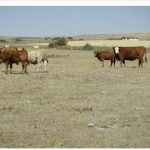A lack of trust between Canadian hog producers and packers is weakening the industry, contributing to wild price fluctuations and could lead to greater American domination of the industry, says the retiring president of the Canadian Meat Council.
Bill Mulock of Tasty Chip Steak Products of Islington, Ont., told the annual CMC meeting Feb. 4 that distrust between packers and farmers has been an issue for decades.
“The solution seems as elusive as ever,” he said, while predicting that by raising the issue publicly, he would be making many council members uneasy.
Read Also

Land crash warning rejected
A technical analyst believes that Saskatchewan land values could be due for a correction, but land owners and FCC say supply/demand fundamentals drive land prices – not mathematical models
Mulock said the problem is simple to describe.
Hog producers want to be able to sell their animals “wherever they want, for the best price.”
Packers want to retain the ability to buy hogs “wherever they want, at the best price.”
Neither side feels they rely on the other for what they need – stable, affordable supplies on one side and markets at decent prices on the other.
The result is that Canadian packers do not always have enough hogs to operate at full capacity, while Canadian hog marketing boards ship into higher-priced U.S. markets.
He said it was a major reason some packing companies have moved west out of Ontario. “They couldn’t get the hogs here.”
And lack of planning in the hog industry was part of the cause for last year’s tumble in pig prices, he said. The Canadian herd expanded without consideration of whether there is processing capacity.
Canadian pigs flooded south, causing a political uproar with the Americans. A strike at Quality Meat Packers in Toronto caused even more of a glut.
Mulock suggested an arrangement that would see packers guaranteeing purchases and prices in return for producer guarantees of hogs to fill capacity.
“But I see both sides being unwilling to give up their free market freedom to buy and sell where they want,” he said in an interview after his speech. “I think that is short-sighted.”
Mulock said it means that once the United States eradicates its pseudo-rabies problem in some states, American hogs will start to come north to fill the processor supply gap. The Canadian industry will become more and more integrated into the American industry.
Martin Rice, executive secretary of the Canadian Pork Council, was in the audience to hear the packer leader speak.
He said later the proposal to tie down a pre-arranged portion of Canadian production for Canadian plants would be a hard sell in the pig industry.
“I think producers would want to be able to keep their option of selling into the U.S. if that’s where the higher prices are,” Rice said in a interview.
“I’m not sure there is the trust that packers would live up to a promise to pay a certain price if it turned out they could buy cheaper somewhere else.”
Mulock said a supply-and-demand arrangement in the industry would help stabilize prices and temper the recent trend to sharp peaks and valleys, which hurt both processors and hog farmers.
He said there is more co-operation and stability in Quebec than in the rest of the country.
















